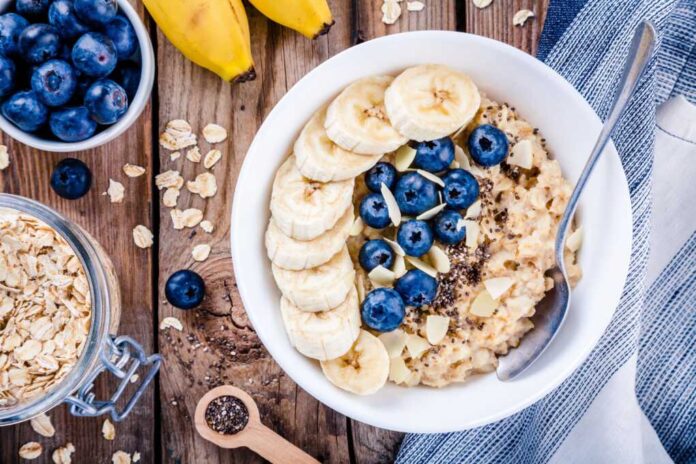
A daily bowl of oatmeal could slash your heart disease risk by up to 20% while delivering a powerful nutritional boost that most Americans are missing.
At a Glance
- Less than 3% of Americans meet the recommended minimum fiber intake, a deficiency linked to increased heart disease risk
- Oats contain beta-glucan, a soluble fiber that can lower LDL cholesterol by up to 10% when consumed regularly
- Research shows consuming oats is associated with lower blood pressure, improved weight management, and reduced inflammation
- The FDA allows health claims linking beta-glucan from whole grain oats to reduced coronary heart disease risk
- All types of oats (steel-cut, rolled, quick) offer similar heart-healthy benefits, though instant varieties may have a higher glycemic index
The Fiber Gap and Heart Health
Most Americans consume only half the recommended daily fiber intake, creating a significant nutritional deficit with serious health implications. According to research, less than 3% of Americans meet the minimum fiber recommendations, despite fiber being abundantly available in whole plant foods like oats. This deficiency isn’t just about digestive health – increasing fiber intake by just 3 grams daily could save billions in medical costs related to constipation while reducing risks for diabetes, heart disease, stroke, cancer, and obesity.
The connection between fiber and heart disease prevention was first proposed by Dr. Hugh Trowell, who developed what he called the “fiber hypothesis.” Though initially considered “simple-minded” by some peers, his theory that fiber consumption protects against heart disease has been validated by decades of research. The evidence is particularly strong for oats, with studies showing that consuming at least 3 grams of oat beta-glucan daily can reduce LDL cholesterol by up to 10% and decrease cardiovascular disease risk by as much as 20%.
Happy #NationalOatmealMonth! Oatmeal, which is a whole grain, is a great source of fiber which may help reduce blood cholesterol levels and lower the risk of heart disease. Learn more about whole grains here https://t.co/WgDxNxTU4z pic.twitter.com/upaDfSD6Dx
— USDA Food and Nutrition Service (@USDA_FNS) January 8, 2024
How Oats Help Your Heart
Oats contain a special type of soluble fiber called beta-glucan that works through multiple mechanisms to protect your cardiovascular system. When consumed, beta-glucan forms a gel-like substance in the digestive tract that binds with cholesterol-containing bile acids, preventing their reabsorption and helping to remove them from the body. This process forces the liver to use more cholesterol to produce new bile acids, effectively lowering blood cholesterol levels, particularly the harmful LDL variety.
Beyond cholesterol reduction, oats provide significant cardiovascular benefits through multiple pathways. Research published in the Journal of the American Heart Association found that oat fiber intake was associated with lower serum levels of inflammatory markers linked to heart disease. Additionally, regular oat consumption correlates with lower body mass index and reduced systolic and diastolic blood pressure. A comprehensive study examining cardiovascular outcomes found that people who regularly consumed oats had a lower risk of requiring future revascularization procedures.
Nutritional Profile Beyond Fiber
While fiber gets most of the attention, oats deliver an impressive array of other nutrients that support heart and overall health. Oats, formally named Avena sativa, are gluten-free whole grains rich in vitamins, minerals, and antioxidants. They provide manganese, phosphorus, magnesium, copper, iron, zinc, folate, and B vitamins essential for energy metabolism and immune function. A single serving of oats delivers more than 20% of the daily value for several of these nutrients.
The antioxidant content of oats is particularly noteworthy. They contain unique compounds called avenanthramides, which are almost exclusively found in oats. These compounds have been shown to reduce inflammation and increase nitric oxide production, which helps dilate blood vessels and improve blood flow. Research indicates these anti-inflammatory effects may help prevent the hardening of arteries that leads to heart disease. Oats also contain important plant compounds like phytoestrogens and phenolic compounds that further support cardiovascular health.
Incorporating Oats Into Your Diet
Adding heart-healthy oats to your diet doesn’t have to mean boring bowls of plain oatmeal. While traditional oatmeal topped with fruit, nuts, and low-fat milk remains a nutritious breakfast option, oats can be incorporated into countless dishes. They can be used to create savory porridges topped with vegetables and eggs, blended into smoothies for added thickness and nutrition, used as a binding agent in veggie burgers, or as a substitute for breadcrumbs in recipes.
The different types of oats available – steel-cut, rolled, quick-cooking, and instant – offer similar nutritional profiles, though they vary in processing and texture. Steel-cut oats are the least processed and have a chewy texture, while rolled oats are flattened and cook more quickly. Quick and instant oats are the most processed, with instant varieties sometimes containing added sugars or flavorings that may reduce their nutritional value. For optimal heart health benefits, choose plain varieties without added sugars and aim for at least 3 grams of beta-glucan daily, which translates to about 1½ cups of cooked oatmeal.


















